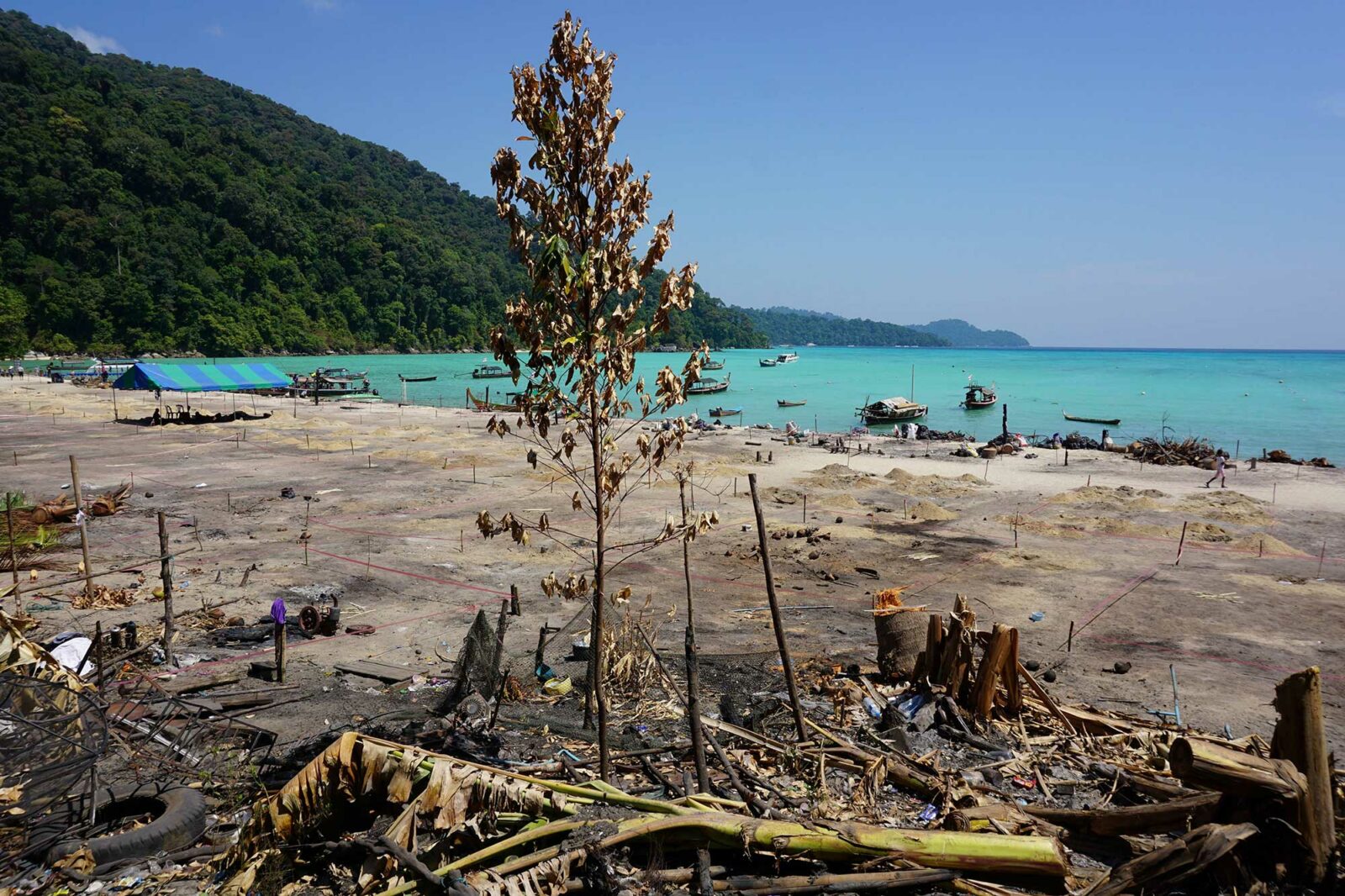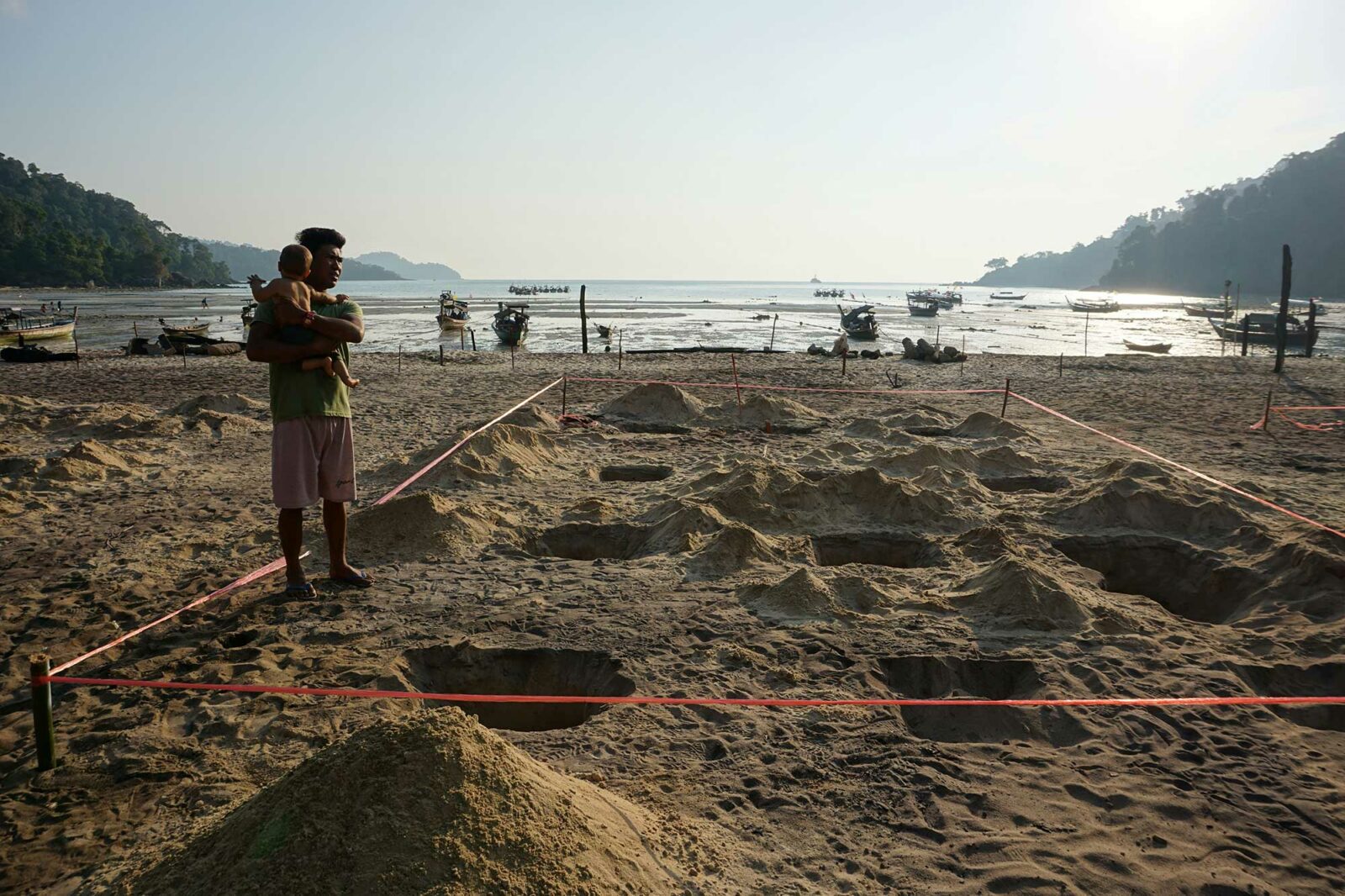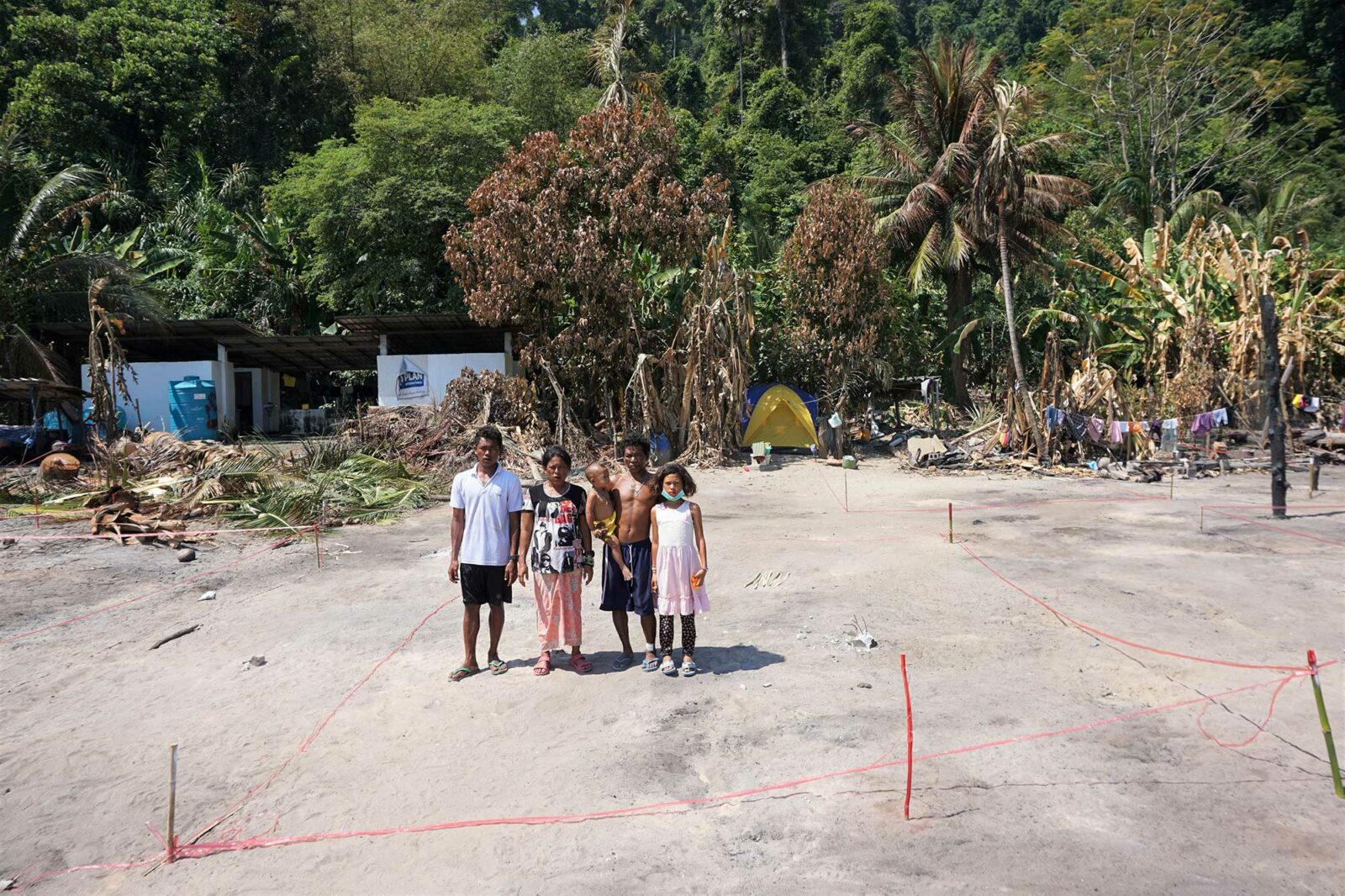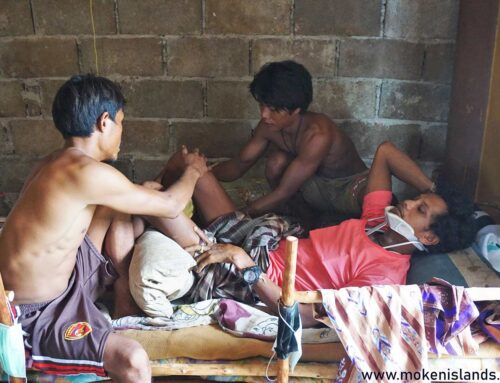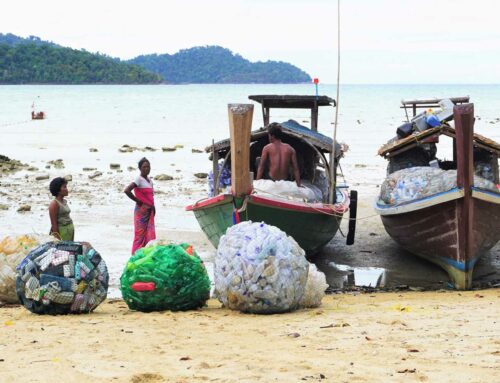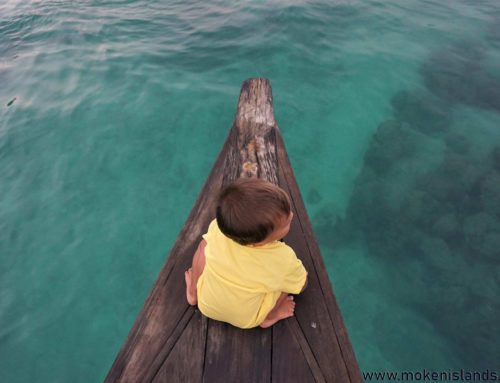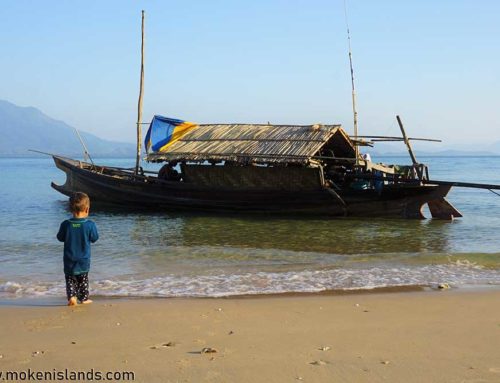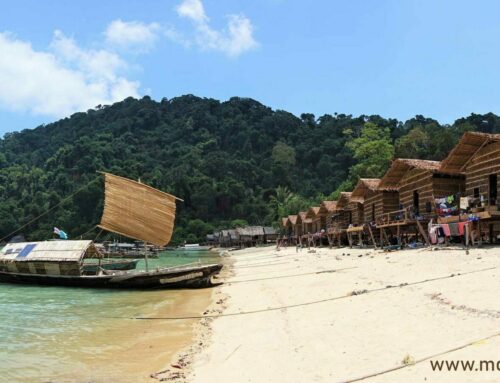Moken Tribe of Seafaring People Ask to Expand Their Village
Moken Tribe of Seafaring People Ask to Expand Their Village, As Previous Structures Were Too Congested. Committee Member Agrees, Citing Their Ancestral Rights to the Land
On 07 February, General Surin Pikulthong, in his role as a member of the Committee for the Affairs of Indigenous Peoples, held a press conference regarding restoration of the Moken village on Surin Island in Phang Nga province after a fire burned 60 homes, nearly consuming the entire village. The provincial government and national park are rushing to construct new housing and quickly move past the crisis.
Many who are familiar with the situation, however, worry that the current plans for housing—which would rebuild the structures exactly as they once stood—would be too cramped, and think that expansion of the village should be considered. Before continuing with construction plans, General Pikulthong believes it should be clearly understood that 1. “the Moken Tribe were present and living in the Surin Islands well before the creation of Thailand or any national parks. Thus, following legal principles, the government or national park should not carry out any actions negatively effecting the existing rights of the Moken people.”
Mr. Pikulthong also noted 2. “There must not be actions taken that negatively effect the longstanding culture and way of life of the Moken. Although it may not be possible to do everything exactly as the Moken would like to do, their considerations should come first, and we should leave them with a strong path moving forward. After the 2004 Tsunami, others took the opportunity to forcibly sweep away 13 separate communities of indigenous seafaring people.
“In the case of this large fire, we should not see this as an opportunity to forcibly take away any rights of the villagers. We must not forget that this is the home of the Moken people, who have been here longer than the park. Thus, as it’s their ancestral home, they should have the right to have a say in how construction of new housing is planned. New housing should allow them the right to health, safety, and stability in line with their way of life; for example, allowing each house to have direct access to a stretch of the beach where they can leave their wooden boats.
“In the past, Moken people used to live in small bays and harbors spread out along the islands of the Andaman sea, but were swept up and forced to live all together in one place. This lead to the congested conditions they lived in prior to the fire; so, we ought to expand the area in which they are allowed to live. They have been here longer than any of us, but their rights were essentially seized away and they were forced to live in one location; I see no reason why we can’t better accommodate their needs going forward. I have spoken to the Deputy Minister of the Ministry of Natural Resources and Environment on the phone, and urged him to call a meeting to allow the Moken on Surin Island to state their needs and concerns before we rush to rebuild everything.
“All sides involved in the matter should be invited, not just high-ranking officials of the national park and Ministry of Natural Resources and lawyers privately discussing it.” The committee member also stated “the most important thing is to convince the administration overseeing this effort to fulfill their duty to respect the rights of the people involved, because there is no law that gives the government power to dictate the lives of ethnic groups who predated the government that are living on their ancestral lands.”
The committee member also made the case that Moken people are not simply people who are waiting for others to help them. They should be seen as being worthy of honor and respect, just like any other people in Thailand. The Moken people who suffered the ordeal of seeing their village burned down should be given some opportunity to expand their village. They shouldn’t be left in constrained housing conditions, tightly bundled together, and treated as if they are poor, weak people who are not allowed any power over their current situation.
Mr. Suriyan Klathale, a Moken from the Surin islands, states “reconstructing the houses as they were originally built after the 2004 tsunami may not be enough, as the population on the island has increased; some one-family houses have 2 or 3 families. Those of us living there are also unaware what the new construction plans will be, as no one has asked us, and we haven’t had the chance to ask any officials involved. We hope that in the least, if they do build the houses using the same plan, that they can at least not be directly facing each other, as it is a bad omen according to our traditional beliefs to have houses laid out this way.
“To be honest, the beach where the fire happened has enough space for 20-30 additional houses to be built and laid out farther apart, not facing each other. Unfortunately, the national park has not agreed to permit access to the entire beach, and its unclear whether we will even have all of the area on the beach that we previously had, which could make things even more congested.”
Ms. Suni Tairod, professor at Rangsit University and former the Boardmember of the International Relations Faculty, said, “in our society, it’s a very clear rule that we should help indigenous populations in times when they are struck by disaster, especially in events like the (2004) tsunami. We should not only help the Moken to rebuild, but to realize that we should also help them to further their development as a community. Thai citizens, and the state itself, should be happy and willing to provide assistance to the diverse communities that live within our Kingdom. The response and outpouring of donations has been amazing.
“We should, however, avoid oversimplifying the matter by not bothering to accept or understand the cultural values of the Moken people we hope to help. If we don’t understand the victims of this incident, we may be endangering their future. Most importantly, we shouldn’t forcibly remove them from their ancestral home. Each step of the restoration of the village should also restore the culture of the Moken people. The relief process has to be consistent with their traditional values, and we need to realize that we limit their ability to be self-sufficient without them having rights of citizenship.”
Mr. Mitree Jongkraichak, of the Network of Tsunami Survivors, stated, “the rebuilding of the Moken homes lost to the fire is an opportunity to work toward restoration of the Moken lifestyle in accordance with previous agreements. It’s not that this process is simply one of designing and building the same houses, it should be one that encompasses the true tradition and culture of indigenous people. The Chief of the Committee on Indigenous Affairs should call a meeting with the people as soon as possible; because restoration efforts like these are their direct responsibility, and they should undertake these matters from a basis of proper understanding of the community’s needs.
“Reports also should call attention to the National Park’s duty to properly survey the area, and to ask questions of different people in the village. Right now, villagers don’t know what the new layout will be, as they have not had the opportunity to ask questions, or consult with, those who will be building it. This has made everyone in the village worried that it will further infringe upon their cultural traditions and way of life.”
Mr. Ngui Klathale is one of the Moken on Surin who is acting as a response coordinator, and one of many survivors still looking for relief. Mr. Ngai stated, “I’m sad about losing gold piece I had saved; outside of this, 30,000 baht in cash burned in the fire, and when combined with other valuables, tools, et cetera, my total losses were around 200,000 baht.
“I wonder how long it will take for me to save this much again, I honestly don’t know if I’ll be able to. Some lost a lot more than I did. We have no idea how aid resources will be distributed, or even what aid resources will be distributed,” he mentioned.
Mr. Ngui also said “In regards to these new houses, I still don’t know what will be done because no one has communicated with the Moken people. No one involved in the reconstruction has asked any questions of us, or allowed us to ask questions of them. Personally, as long as they build something for us, I am grateful. Assuming it’s possible, it would be great to rebuild the wood houses with thatch roofs, but more spread out as the houses were very densely packed, with 10 people sometimes living in a house built for 4.
“It would also be great to find ways for them to be more durably constructed and spaced farther apart, and not directly facing each other but staggered diagonally. It’s believed by our people that having houses directly facing each other will bring ill fortune upon those who live in them. What’s most important is building them in a way that would avoid the risk of another fire like we just had. Maybe have houses in pairs, as opposed to being in large groups directly next to each other,” he stated.
Ms. Meesia Klathale, a spiritual leader of the Moken people, aged 73, states: “I am most disappointed about losing my identification card and house registration. I’m worried that if I leave my community, I may be arrested for not having proper identification. We’ve been lucky to have many of our relatives from other islands come visit to lift our spirits and bring some food.
“If anyone involved in the construction were to ask me, I would like to see something similar to what we had, what’s most important is being close to the ocean. It’s been 3 days and we haven’t heard anything from anyone, we’ve just been left to look around wondering what will become of our village.”
The grandmother of the island, as she’s known, continued, “I’m worried about my children, my grandchildren, my nephews and nieces, because I have no idea what their future will be. They likely won’t be here much longer. We’ve had many people try to convince us to live on the mainland, or on Koh Phra Thong. I’ve been to the places some have asked us to resettle, and they were not really suitable as they don’t provide access to the open sea, and eventually we made our way back here to where we’ve always been.
“I was born here, my mother and father died here, I don’t want to go anywhere else. Every year, we do our traditional Lo Bong ceremony where we all gather to pay respect to our ancestors, although certain aspects gradually are lost or changed: for example, chickens are now used instead of turtles. I worry that we won’t be happy, I never could have imagined our village going up in flames like it did,” Meesia remarked.
Mr. Putthapoj Khuphrasit, head of Koh Surin National Park, went with 30 soldiers to the site of the village to begin preparing the site for construction on 08 February, suggesting that the area will not be expanded beyond the existing 6.16 rai (a rai is 40 square meters), and houses will be placed together in groups of 20. The distance between homes should be slightly larger than it was before, and they will be built of the same materials.
Reporters asked about complaints from the community that the houses were quite densely packed, wondering whether a larger area on the existing beach could be used, or if they could be granted access to other beaches they traditionally used. Mr. Putthapoj stated, “It’s unlikely that we would expand any development beyond the current beach, as we have to balance the needs of the community with the management of the protected environment inside of the park.”
“Nowadays, the Moken people have sufficient means to get by, we have 50 people from the village who are employed by the park, and we provide them with breakfast and lunch, and there’s always plenty to bring back home for dinner. Many of the men in the village are also employed by tour operators. The village elders are able to stay at home and make souvenirs to sell to tourists. They have what they need.”
Source: Original article by Khaosod
Media contacts please email info@mokenislands.com or call +66 81 944 1275
